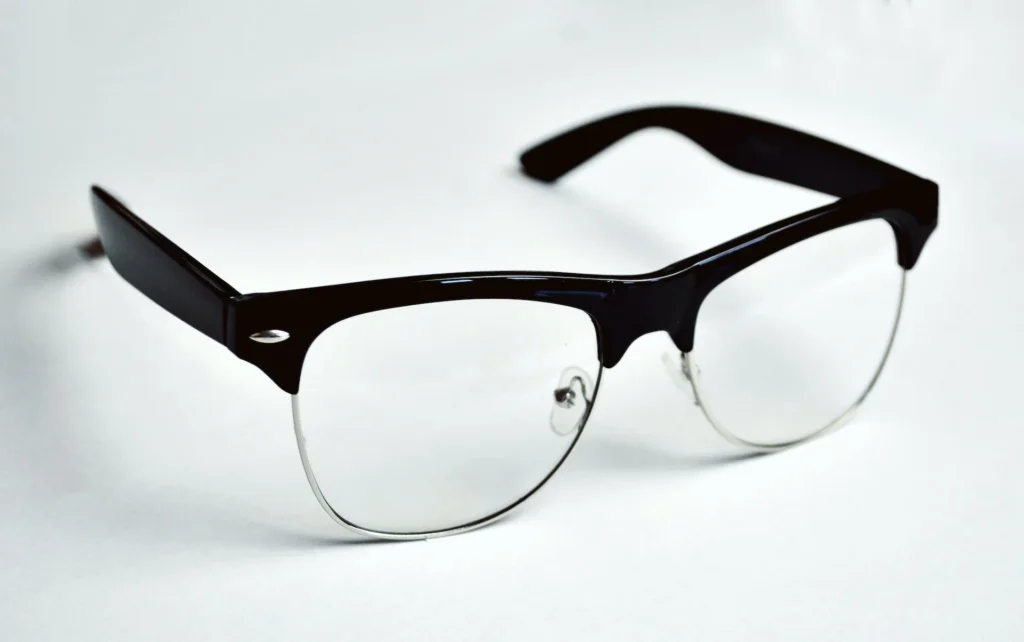Reading glasses are a common solution for people who have trouble seeing up close, especially as they age. They are usually cheap, easy to find, and convenient to use. However, reading glasses are not without drawbacks. In fact, there are some disadvantages of reading glasses that you might not know about.
In this article, I will tell you about 10 possible disadvantages of reading glasses that can affect your vision, comfort, and lifestyle. So, let’s get started!
What are Reading Glasses?
Reading glasses are simple magnifying lenses that help you see small prints or objects that are close to your eyes. They are typically worn only when you need to read something, such as a book, a menu, or a label. They come in different strengths or powers, measured in diopters (D), ranging from +1.00 to +4.00.

Reading glasses are mainly designed for people who have presbyopia, which is a natural loss of near vision that occurs with age. Presbyopia affects most people over 40 years old and makes it hard to focus on things that are within arm’s length.
Also Read: Do The Nearsighted People Need Reading Glasses?
Reading glasses can also be used by people who have other refractive errors, such as myopia (nearsightedness), hyperopia (farsightedness), or astigmatism. However, these people may need different powers for each eye or custom-made lenses to correct their vision properly.
10 Disadvantages of Reading Glasses
While reading glasses can be helpful for some people, they also have some disadvantages that you should be aware of. Here are 10 of them:
- They can cause eye strain, headaches, or blurred or double vision if the wrong glasses are used. If you use reading glasses that are too strong or too weak for your eyes, you may experience discomfort or difficulty seeing clearly. You may also have trouble adjusting your focus when you switch between near and far objects.
- They can distort vision, especially at the edge of the lens if you have a strong prescription or astigmatism. Reading glasses are usually made with spherical lenses that have the same power throughout. However, if you have a high degree of nearsightedness, farsightedness, or astigmatism, you may need lenses that have different powers in different areas to correct your vision. Otherwise, you may see distorted or blurry images at the periphery of your vision.
- It can be hard to see in the far periphery or sides of your vision depending on the frame you choose. Reading glasses often have small frames that cover only a portion of your eyes. This can limit your peripheral vision and make it difficult to see things that are not directly in front of you. This can be dangerous when you are driving, walking, or doing other activities that require good situational awareness.
- They may not be comfortable to wear. Reading glasses can be annoying or uncomfortable to wear for various reasons. For example, they may slide down your nose, pinch your ears, fog up your lenses, or scratch your face. They may also interfere with your hairstyle, makeup, or jewelry.
- Cheaply made glasses may be a waste of money as they don’t correct the refraction issue. Reading glasses that are sold in drugstores or online may not be made with high-quality materials or craftsmanship. They may break easily, scratch easily, or lose their effectiveness over time. They may also not fit your eyes well or provide the right amount of magnification for your needs.
- They can make you dependent on them. Reading glasses can make you rely on them more and more as you use them frequently. This can make it harder for you to see without them or adjust to other types of lenses. It can also make you feel less confident or capable without your glasses.
- They do not address the underlying cause of your vision problem. Reading glasses only help you see better temporarily by magnifying the images that enter your eyes. They do not treat the root cause of your vision problem, which is usually related to the shape or function of your eye. For example, if you have presbyopia, it is because your eye lens has become less flexible and cannot change its shape to focus on near objects.
- They do not protect your eyes from harmful UV rays. Reading glasses do not block ultraviolet (UV) rays from the sun that can damage your eyes and increase your risk of cataracts and macular degeneration. You may need to wear sunglasses over your reading glasses or look for reading glasses that have UV protection built-in.
- They do not correct other vision problems that may affect your reading ability. Reading glasses only help you see things that are close to your eyes. They do not correct other vision problems that may affect your reading ability, such as dry eyes, eye fatigue, glaucoma, or diabetic retinopathy. You may need to see an eye doctor to diagnose and treat these conditions.
- They can be inconvenient to carry around and use. Reading glasses can be a hassle to carry around and use in different situations. You may need to have multiple pairs of glasses for different purposes, such as reading, working, or driving. You may also need to constantly put them on and take them off depending on what you are doing. You may lose them, forget them, or break them easily.
FAQ’s
Here are some frequently asked questions about reading glasses and their disadvantages:
How do I know what strength of reading glasses I need?
You can use a reading chart or an online tool to test your near vision and find out what power of reading glasses you need. You can also visit an eye doctor who can measure your eyes and prescribe the right strength of reading glasses for you.
How often should I replace my reading glasses?
You should replace your reading glasses whenever they become damaged, scratched, or ineffective. You should also replace them if your prescription changes or if you experience any discomfort or vision problems with them.
Can I wear reading glasses all the time?
No, you should not wear reading glasses all the time. Reading glasses are meant to be used only when you need to see something up close. Wearing them all the time can cause eye strain, headaches, blurred vision, or dependency. You should take them off when you are not reading or doing any near work.
Can I wear reading glasses over my regular glasses or contact lenses?
No, you should not wear reading glasses over your regular glasses or contact lenses. This can cause distortion, confusion, or double vision. It can also damage your glasses or lenses. You should use bifocal or multifocal glasses or lenses instead if you need both near and far correction.
Summary
Reading glasses are a popular and convenient way to improve your near vision as you age or develop presbyopia. However, they also have some disadvantages that you should be aware of before using them.
Reading glasses can cause eye strain, headaches, blurred vision, distortion, discomfort, dependency, waste of money, lack of treatment, lack of protection, lack of correction, or inconvenience. They may also not suit your lifestyle, preferences, or needs.
The best way to find out what option is right for you is to consult an eye doctor who can examine your eyes, assess your vision, and recommend the best solution for your condition. You should also follow your eye doctor’s advice on how to take care of your eyes and maintain your vision health.






